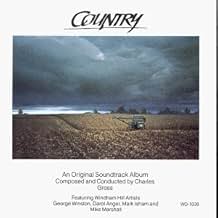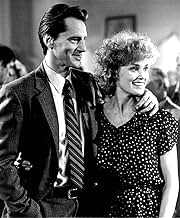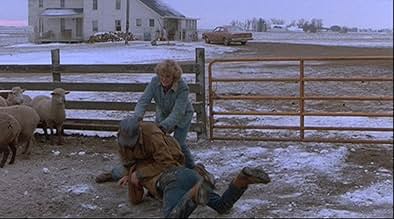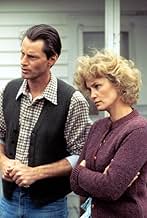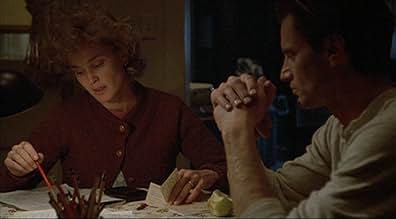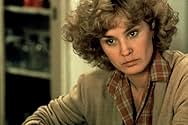CALIFICACIÓN DE IMDb
6.6/10
2.4 k
TU CALIFICACIÓN
Gilbert Ivy y su esposa Jewell son granjeros. Parece que trabajan contra viento y marea, sin producir ningún excedente económico. Gilbert ha perdido la esperanza de prosperar, pero su esposa... Leer todoGilbert Ivy y su esposa Jewell son granjeros. Parece que trabajan contra viento y marea, sin producir ningún excedente económico. Gilbert ha perdido la esperanza de prosperar, pero su esposa decide luchar por su familia.Gilbert Ivy y su esposa Jewell son granjeros. Parece que trabajan contra viento y marea, sin producir ningún excedente económico. Gilbert ha perdido la esperanza de prosperar, pero su esposa decide luchar por su familia.
- Nominado a 1 premio Óscar
- 1 premio ganado y 3 nominaciones en total
Theresa Graham
- Marlene Ivy
- (as Therese' Graham)
Robert L. Somers
- Grain Elevator Operator
- (as Robert Somers)
Frank Noel
- Semi Driver
- (as Frank Noel Jr.)
Warren Duit
- Preacher
- (as Rev. Warren Duit)
James N. Harrell
- Jim - Bank Officer
- (as James Harrell)
- Dirección
- Guionista
- Todo el elenco y el equipo
- Producción, taquilla y más en IMDbPro
Opiniones destacadas
"Country" was filmed in 3 miles north and 1 mile west of Dunkerton, IA. A deserted farmstead was selected for the film because it was a surprise that Iowa had modern farm homes. I lived 8 miles from the farm used on a farm of my own. I knew at least 8 of the extras in the movie, so I'm fairly confident of my facts. A number of the farmers in the movie were in fact retired farmers. Reagonomics was the cause of nearly of the the farmers problems. The FHA and bank had encouraged farmers to expand their farm operations. Shortly after they had made huge financial commitments grain and livestock prices dropped drastically. Neither the FHA or banks were overly sympathetic to their plights. The relationship of the Ivy family is very believable and touching, as is Jewels attempt to rally support from among the neighbor farmers. The auction has a basis in history referred to as the "nickel" auctions. During the 30's as farmers were foreclosed on the neighbors would bid a nickel on a piece of equipment and when winning the bid return it to the farmer as a gift. It was their way to support those that supported them. Oh, by the way the guy yelling who gets the money is my dad, and he and his dad went to these nickel auctions. If I can answer and further question about the area etc., contact me at, stoutwood50@aol.com Tag it Country questions.
A sensitive performance by Jessica Lange as a strong wife and mother who fights to save the family farm. A strong cast of fine actors includes: Sam Shepard, Wilford Brimley, Matt Clark and Therese Graham. This film is realistic,especially for the time in which it was released, 1984. You feel the sense of desperation thanks to outstanding performances.
A sobering look at farms in crisis. Shows how farmers tried to hide herds from government lenders, the human cost of financial strain, the hopelessness shown by families who have reached the end of their financial rope. Sam Shepard and Jessica Lange anchor a strong and capable cast that effectively portrays the plight of U.S. farmers in the mid-1980s. Cinematography well done, with Kansas and Nebraska location shooting. Auction scene is heart-wrenching, as a farm held by generations of one family is auctioned to satisfy debtors. To watch the bidders converge on the equipment lined up for sale is a powerful image, repeated many times throughout the Plains states during that period.
In 1984, there were three films produced about farm life in the midwest. The first, and best film, "Places in the Heart" showcased an older form of life, a world where the farmer's only real enemy was nature; human or mother. The second two - "The River" and this film, "Country" - focused on the modern (for 1984, that is) struggles of farming the land. Of those two films, "Country" is the better. The real curious problem with "The River" is that it failed to show the average person's life. It felt more like a disaster movie, and the farmer seemed more like a poor, pathetic loser than a noble man trying to stay alive.
The main thing that holds it all together is Richard Pearce, a director who makes personal, legitimate films as opposed to big events and images. Five years earlier, he covered similar ground in his first film, "Heartland". I'm a firm believer that great cinematography can make a great film. If something is worth looking at, the first steps are already covered. It's not that David M. Walsh is necessarily shooting in a mindblowing, new way, but Pearce gives him wonderful things to photograph. There's so much time given to just let things happen. The final scene is a perfect example. The wordless, drawn-out connection of two humans. It seems to go forever. This film lets you watch at the most perfect, crucial moments.
The actors. What can I say about them? They're utterly convincing, and that's got to be the main and almighty concern for any film-goer. Jessica Lange, Sam Shepard, and Wilford Brimley are all more human than some of the bigger stars that might have been picked to act in such a film. They still have that sense of not being watched, at least enough so that they can live a character untouched. Lange, who I've seen in several films, never quite impressed me like she does here. Brimley, the glorious character actor who made a career in the 1980s playing 'that guy' in quiet dramas, is very much welcome here. In fact, I can't ever remember an instance when I regretted seeing him on film. He adds needed personality to the mix. The children (played by Theresa Graham and Levi Knebel) don't ever feel less than perfectly real.
There are a lot of parts to this film, passages and images. In fact, that's what most makes it all work. If one thought feels out of place, humanity strikes again like lightning. Yes, there is the obligatory Big Statement scene, where the music swells and all poor farmers rise up against the Man. And yes, it is almost that bad. But even though it might make your eyes roll, there's far too much real life and human subtlety on display in "Country" for such a tired scene to crush it.
Richard Pearce directs true, quiet dramas. If you want more of what you felt watching this, seek out these other films by him - Threshold (1981), The Long Walk Home (1990), A Family Thing (1996).
The main thing that holds it all together is Richard Pearce, a director who makes personal, legitimate films as opposed to big events and images. Five years earlier, he covered similar ground in his first film, "Heartland". I'm a firm believer that great cinematography can make a great film. If something is worth looking at, the first steps are already covered. It's not that David M. Walsh is necessarily shooting in a mindblowing, new way, but Pearce gives him wonderful things to photograph. There's so much time given to just let things happen. The final scene is a perfect example. The wordless, drawn-out connection of two humans. It seems to go forever. This film lets you watch at the most perfect, crucial moments.
The actors. What can I say about them? They're utterly convincing, and that's got to be the main and almighty concern for any film-goer. Jessica Lange, Sam Shepard, and Wilford Brimley are all more human than some of the bigger stars that might have been picked to act in such a film. They still have that sense of not being watched, at least enough so that they can live a character untouched. Lange, who I've seen in several films, never quite impressed me like she does here. Brimley, the glorious character actor who made a career in the 1980s playing 'that guy' in quiet dramas, is very much welcome here. In fact, I can't ever remember an instance when I regretted seeing him on film. He adds needed personality to the mix. The children (played by Theresa Graham and Levi Knebel) don't ever feel less than perfectly real.
There are a lot of parts to this film, passages and images. In fact, that's what most makes it all work. If one thought feels out of place, humanity strikes again like lightning. Yes, there is the obligatory Big Statement scene, where the music swells and all poor farmers rise up against the Man. And yes, it is almost that bad. But even though it might make your eyes roll, there's far too much real life and human subtlety on display in "Country" for such a tired scene to crush it.
Richard Pearce directs true, quiet dramas. If you want more of what you felt watching this, seek out these other films by him - Threshold (1981), The Long Walk Home (1990), A Family Thing (1996).
Thematically comparable to "The Grapes Of Wrath", "Country" pits a modern Iowa farm family against an imperial American government, via oppressive FHA agency bureaucrats, who intend to execute farm foreclosures on rural residents who can't pay back their loans.
The plot focuses on details of the family's everyday life, and the grief the FHA causes. Characters spend a lot of time at the dinner table talking and eating. Outdoor shots feature a typical Midwest farm setting. Absence of background music in some segments, detailed production design, and ambient sound effects all combine to convey a heightened sense of realism. Overall acting trends well above average. Jessica Lange is quite good as the mother who holds the family together and takes action against the FHA.
On the other hand, the setting and the characters tend to be stereotypical and shallow, except perhaps for the father.
Good editing keeps the plot moving. Even so, I don't think this film would fly today. It's too quiet, too introspective, too slow for modern, especially urban, viewers. Which is unfortunate, because the film speaks to ordinary people regardless of whether they live in cities or on farms.
Politically, I'm afraid that not a lot has changed in America since this film was released in 1984. Imperial institutions still oppress and tyrannize. And films like "Country", "The Grapes Of Wrath", and others, effectively document this tragic historical reality.
The plot focuses on details of the family's everyday life, and the grief the FHA causes. Characters spend a lot of time at the dinner table talking and eating. Outdoor shots feature a typical Midwest farm setting. Absence of background music in some segments, detailed production design, and ambient sound effects all combine to convey a heightened sense of realism. Overall acting trends well above average. Jessica Lange is quite good as the mother who holds the family together and takes action against the FHA.
On the other hand, the setting and the characters tend to be stereotypical and shallow, except perhaps for the father.
Good editing keeps the plot moving. Even so, I don't think this film would fly today. It's too quiet, too introspective, too slow for modern, especially urban, viewers. Which is unfortunate, because the film speaks to ordinary people regardless of whether they live in cities or on farms.
Politically, I'm afraid that not a lot has changed in America since this film was released in 1984. Imperial institutions still oppress and tyrannize. And films like "Country", "The Grapes Of Wrath", and others, effectively document this tragic historical reality.
¿Sabías que…?
- TriviaSecond theatrical feature-film release from then-new Walt Disney Pictures' new studio branding of Touchstone Films. The first, Splash (1984), had debuted earlier in 1984, the year "Country" premiered. The name was re-branded to Touchstone Pictures in 1987.
- ErroresThe Ivy family are shown watching a University of Iowa football game after Sunday church services. college football is played on Saturdays.
- Citas
Tom McMullen: Listen, you owe the money, nobody forced you to borrow it.
- Bandas sonorasHome
Written by George Winston
Selecciones populares
Inicia sesión para calificar y agrega a la lista de videos para obtener recomendaciones personalizadas
- How long is Country?Con tecnología de Alexa
Detalles
- Fecha de lanzamiento
- País de origen
- Idioma
- También se conoce como
- Cosechas de ira
- Locaciones de filmación
- Black Hawk County, Iowa, Estados Unidos(locations: Readlyn and Waterloo)
- Productoras
- Ver más créditos de la compañía en IMDbPro
Taquilla
- Presupuesto
- USD 10,000,000 (estimado)
- Total en EE. UU. y Canadá
- USD 9,640,000
- Fin de semana de estreno en EE. UU. y Canadá
- USD 24,443
- 30 sep 1984
- Total a nivel mundial
- USD 9,640,000
- Tiempo de ejecución
- 1h 45min(105 min)
- Mezcla de sonido
- Relación de aspecto
- 1.85 : 1
Contribuir a esta página
Sugiere una edición o agrega el contenido que falta




